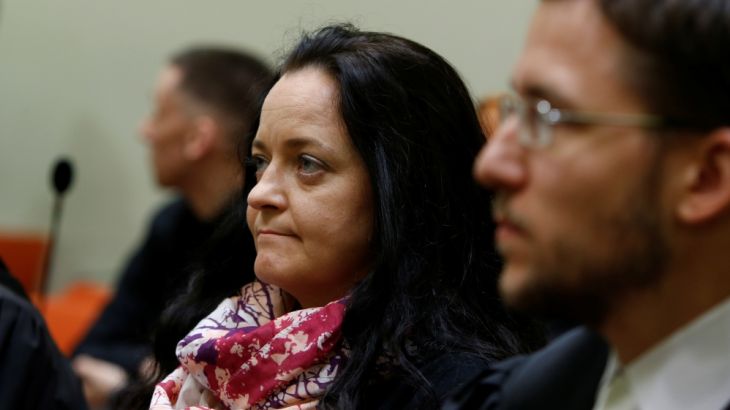Germany jails neo-Nazi gang member for life over racist killings
Beate Zschaepe is found guilty of deadly shootings of Turkish and Greek-born immigrants as well as a German policewoman.

A Munich court has sentenced the only surviving member of a German neo-Nazi cell behind a string of racist murders to life in prison, ending a five-year trial.
Beate Zschaepe, 43, was found guilty on Wednesday on 10 counts of murder in deadly shootings of nine Turkish and Greek-born immigrants as well as a German policewoman.
Keep reading
list of 4 items‘Feel less and less like playing’: Vinicius Jr in tears over racist abuse
‘Rendered invisible’: A wave of anti-Arab violence tests US hate crime laws
Germany bans far-right Austrian nationalist Martin Sellner from entry
Al Jazeera’s Dominic Kane, reporting from Munich, said: “Effectively, she has been found guilty of complicity in the acts. Not necessarily saying that she perpetrated these them herself, but her intent was clearly for these murders to happen.”
The judge imposed the maximum sentence because of the “exceptional severity of the crime”.
The murders were carried out by a trio known as the National Socialist Underground (NSU) over seven years from 2000.
Two of the other members, Uwe Mundlos and Uwe Boehnhardt, killed themselves in 2011 when police discovered the gang by chance.
Zschaepe had denied taking part in the murders but had, through her lawyer, said she felt morally guilty for not stopping them.
![The murders were carried out by the National Socialist Underground [Michaela Rehle/Reuters]](/wp-content/uploads/2018/07/a2b836c912e340a1854cd920f487edc1_18.jpeg)
It was Zschaepe who revealed, after the two Uwes died, the scope of the NSU’s bloody crimes to a shocked German public, by releasing a confession video set to a Pink Panther cartoon theme, which mocked the victims and police.
It was only then that Germany woke up to the fact that the series of nationwide killings, long blamed by police on immigrant crime gangs, had in fact been committed by organised fascists from the country’s formerly communist east.
The case deeply shocked a nation that has struggled to atone for its dark Nazi past and which had associated terrorism mainly with far-left and Islamist fighters, not right-wing extremists.
It was Germany’s biggest trial since the 1960s Auschwitz hearings against perpetrators of the Holocaust, and the 1970s proceedings against the left-wing extremist Baader-Meinhof gang.
The files from the mega-trial now top 300,000 pages, but the victims’ relatives say many questions remain unanswered, including how the killers chose their victims.
In 2012, Chancellor Angela Merkel pledged that Germany would “do everything we can to clear up the murders and uncover the accomplices and backers and bring all perpetrators to justice”.
Broad network
The same year then head of Germany’s BfV domestic intelligence agency, Heinz Fromm, was forced to resign when it emerged his service had shredded files related to the NSU suspects.
Several federal and state parliamentary committees later spent years trying to understand how the killers went undetected for so long, and the murky role of paid undercover informants inside the far-right subculture.
While the Munich trial has focused on the NSU “trio”, the chairman of the last parliamentary inquest, Uli Groetsch, said it was clear that the three were “supported by a broad network of neo-Nazis”.
On the eve of the verdict, victims’ relatives voiced their belief that many Nazis remain in hiding.
“I’m 100 percent sure that there are still accomplices out there,” said Abdulkerim Simsek, the son of the first NSU murder victim, Enver Simsek.
Simsek claimed that the BfV was still keeping some files under lock and key, charging that “there are obviously quite a few things that are being covered up”.
After the verdict was announced on Wednesday, the Turkish foreign ministry said it was “unsatisfying”.